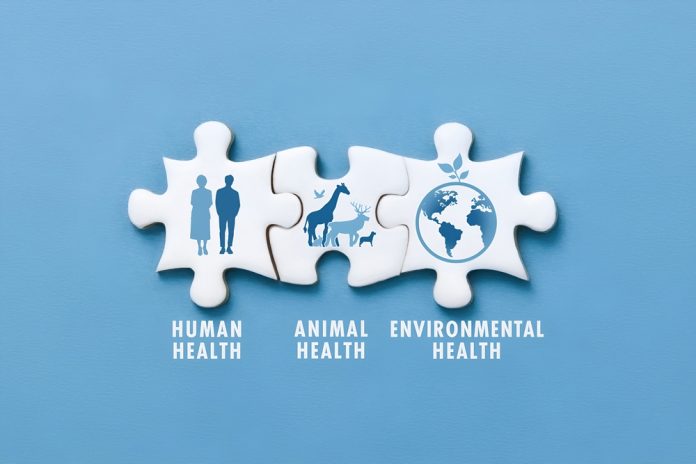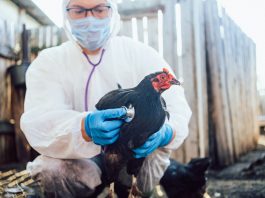In an era where global health challenges are becoming increasingly complex, the importance of a unified strategy that integrates human, animal, plant, and environmental health has never been more apparent.
The Quadripartite collaboration, comprising the Food and Agriculture Organization of the United Nations (FAO), the United Nations Environment Programme (UNEP), the World Health Organization (WHO), and the World Organisation for Animal Health (WOAH), has reaffirmed its commitment to advancing the One Health approach.
Meeting at WOAH headquarters in Paris for the Third Quadripartite Executive Annual Meeting, global leaders called for urgent and sustained investments to enhance One Health implementation worldwide.
As environmental changes, zoonotic diseases, and antimicrobial resistance (AMR) continue to pose critical threats, this integrated approach is essential to safeguarding public health and ensuring a sustainable future.
Understanding the One Health approach
The One Health approach is a collaborative and interdisciplinary strategy that recognises the intrinsic link between human, animal, and environmental health.
By fostering cooperation across multiple sectors, this approach aims to mitigate health risks at their source, ensuring early detection and prevention of potential outbreaks.
The rapid emergence of zoonotic diseases, increasing threats of AMR, and the growing impact of climate change on disease transmission highlight the necessity of a cohesive global response.
Through One Health, governments, policymakers, and scientific communities work together to implement solutions that address these challenges holistically.
Advancements in the One Health agenda
Since its formalisation in March 2022, the Quadripartite has made significant strides in strengthening the One Health framework across various strategic areas.
Efforts have focused on implementing the One Health Joint Plan of Action (OH JPA), which has facilitated cross-sectoral collaboration through workshops and training programmes in Europe, Central Asia, and the Pacific Islands.
These initiatives have helped integrate One Health strategies at the national level, promoting workforce development, joint risk assessments, and enhanced coordination between sectors.
By translating key implementation tools into multiple languages, the Quadripartite has further increased accessibility, ensuring that more nations can adopt and benefit from the approach.
Scientific research and evidence-based decision-making are at the core of One Health’s progress. The Quadripartite has expanded the One Health High-Level Expert Panel (OHHLEP) to incorporate expertise from social sciences, economics, and governance.
This interdisciplinary expansion aims to analyse legal and policy frameworks, identify barriers to implementation, and develop effective strategies for overcoming these challenges.
The creation of the One Health Knowledge Nexus has further reinforced collaborative learning, leading to the establishment of a Community of Practice that explores the return on investment for One Health initiatives.
Another community focusing on governance structures is set to launch in 2025, expanding knowledge-sharing efforts within the global scientific community.
Political engagement and advocacy have played a crucial role in embedding the One Health approach into global discussions.
The Quadripartite has successfully influenced key international policies, including a UN General Assembly declaration on AMR and integrating One Health in G20 Health Ministerial discussions.
Additionally, the collaboration has contributed to adopting a Global Action Plan on Biodiversity and Health at the Convention on Biological Diversity (COP16) and has been instrumental in advancing climate-health policies at major international summits such as COP29.
One of the most pressing challenges for One Health implementation is securing sustainable financial investments. The Quadripartite has developed a Joint Offer, a unified advocacy framework aimed at mobilising targeted funding for One Health initiatives.
Structured engagement with funding partners, high-level dialogues, and roundtable discussions are key strategies being employed to ensure long-term financial support.
By embedding One Health into existing financial mechanisms and strengthening regional investment planning, the goal is to create a stable funding environment that enables continuous progress.
Why further investment is essential
The increasing frequency of global health threats – ranging from pandemics and food safety risks to climate-induced diseases – demonstrates the urgent need for proactive and integrated solutions.
Investing in the One Health approach is not merely a recommendation but an imperative for global health security. The economic and social cost of inaction far outweighs the investment required to build resilient health systems that can prevent crises before they escalate.
A well-funded One Health strategy leads to cost-effective disease prevention, reduces economic losses, and strengthens global preparedness for future health emergencies.
The Quadripartite has emphasised that the time to act is now. With firm commitments and decisive actions from policymakers, donors, and international organisations, One Health can be effectively implemented, ensuring a healthier and more sustainable future for all.





